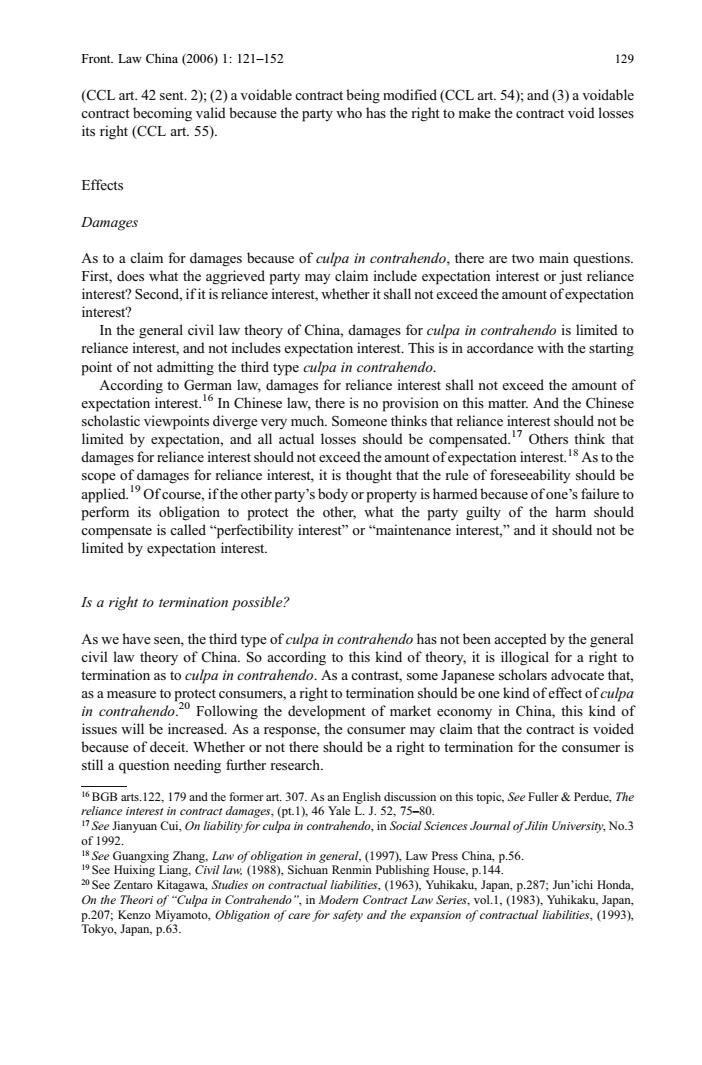正在加载图片...

Front.Law China(2006)1:121-152 129 (CCL art.42 sent.2);(2)a voidable contract being modified (CCL art.54);and (3)a voidable contract becoming valid because the party who has the right to make the contract void losses its right(CCL art.55). Effects Damages As to a claim for damages because of culpa in contrahendo,there are two main questions. First,does what the aggrieved party may claim include expectation interest or just reliance interest?Second,if it is reliance interest,whether it shall not exceed the amount ofexpectation interest? In the general civil law theory of China,damages for culpa in contrahendo is limited to reliance interest,and not includes expectation interest.This is in accordance with the starting point of not admitting the third type culpa in contrahendo. According to German law,damages for reliance interest shall not exceed the amount of expectation interest.In Chinese law,there is no provision on this matter.And the Chinese scholastic viewpoints diverge very much.Someone thinks that reliance interest should not be limited by expectation,and all actual losses should be compensated.Others think that damages for reliance interest should not exceed the amount of expectation interest.18 As to the scope of damages for reliance interest,it is thought that the rule of foreseeability should be applied.Ofcourse,if the other party's body or property is harmed because ofone's failure to perform its obligation to protect the other,what the party guilty of the harm should compensate is called "perfectibility interest"or"maintenance interest,"and it should not be limited by expectation interest. Is a right to termination possible? As we have seen,the third type of culpa in contrahendo has not been accepted by the general civil law theory of China.So according to this kind of theory,it is illogical for a right to termination as to culpa in contrahendo.As a contrast,some Japanese scholars advocate that, as a measure to protect consumers,a right to termination should be one kind of effect of culpa in contralendo.20 Following the development of market economy in China,this kind of issues will be increased.As a response,the consumer may claim that the contract is voided because of deceit.Whether or not there should be a right to termination for the consumer is still a question needing further research. 16BGB arts.122,179 and the former art.307.As an English discussion on this topic.See Fuller&Perdue,The reliance interest in contract damages,(pt.1),46 Yale L.J.52,75-80. See Jianyuan Cui,On liability for culpa in contrahendo,in Social Sciences Journal of Jilin University.No.3 of1992. s See Guangxing Zhang,Law ofobligation in general,(1997).Law Press China,p.56. See Huixing Liang.Civil law.(1988).Sichuan Renmin Publishing House.p.144. See Zentaro Kitagawa,Studies on contractual liabilities,(1963),Yuhikaku,Japan,p.287;Jun'ichi Honda, On the Theori of "Culpa in Contrahendo",in Modern Contract Law Series,vol.1,(1983).Yuhikaku,Japan, p.207;Kenzo Miyamoto,Obligation of care for safety and the expansion of contractual liabilities,(1993). Tokyo,Japan,p.63.(CCL art. 42 sent. 2); (2) a voidable contract being modified (CCL art. 54); and (3) a voidable contract becoming valid because the party who has the right to make the contract void losses its right (CCL art. 55). Effects Damages As to a claim for damages because of culpa in contrahendo, there are two main questions. First, does what the aggrieved party may claim include expectation interest or just reliance interest? Second, if it is reliance interest, whether it shall not exceed the amount of expectation interest? In the general civil law theory of China, damages for culpa in contrahendo is limited to reliance interest, and not includes expectation interest. This is in accordance with the starting point of not admitting the third type culpa in contrahendo. According to German law, damages for reliance interest shall not exceed the amount of expectation interest.16 In Chinese law, there is no provision on this matter. And the Chinese scholastic viewpoints diverge very much. Someone thinks that reliance interest should not be limited by expectation, and all actual losses should be compensated.17 Others think that damages for reliance interest should not exceed the amount of expectation interest.18 As to the scope of damages for reliance interest, it is thought that the rule of foreseeability should be applied.19 Of course, if the other party’s body or property is harmed because of one’s failure to perform its obligation to protect the other, what the party guilty of the harm should compensate is called “perfectibility interest” or “maintenance interest,” and it should not be limited by expectation interest. Is a right to termination possible? As we have seen, the third type of culpa in contrahendo has not been accepted by the general civil law theory of China. So according to this kind of theory, it is illogical for a right to termination as to culpa in contrahendo. As a contrast, some Japanese scholars advocate that, as a measure to protect consumers, a right to termination should be one kind of effect of culpa in contrahendo. 20 Following the development of market economy in China, this kind of issues will be increased. As a response, the consumer may claim that the contract is voided because of deceit. Whether or not there should be a right to termination for the consumer is still a question needing further research. 16 BGB arts.122, 179 and the former art. 307. As an English discussion on this topic, See Fuller & Perdue, The reliance interest in contract damages, (pt.1), 46 Yale L. J. 52, 75–80. 17 See Jianyuan Cui, On liability for culpa in contrahendo, in Social Sciences Journal of Jilin University, No.3 of 1992. 18 See Guangxing Zhang, Law of obligation in general, (1997), Law Press China, p.56. 19 See Huixing Liang, Civil law, (1988), Sichuan Renmin Publishing House, p.144. 20 See Zentaro Kitagawa, Studies on contractual liabilities, (1963), Yuhikaku, Japan, p.287; Jun’ichi Honda, On the Theori of “Culpa in Contrahendo”, in Modern Contract Law Series, vol.1, (1983), Yuhikaku, Japan, p.207; Kenzo Miyamoto, Obligation of care for safety and the expansion of contractual liabilities, (1993), Tokyo, Japan, p.63. Front. Law China (2006) 1: 121–152 129